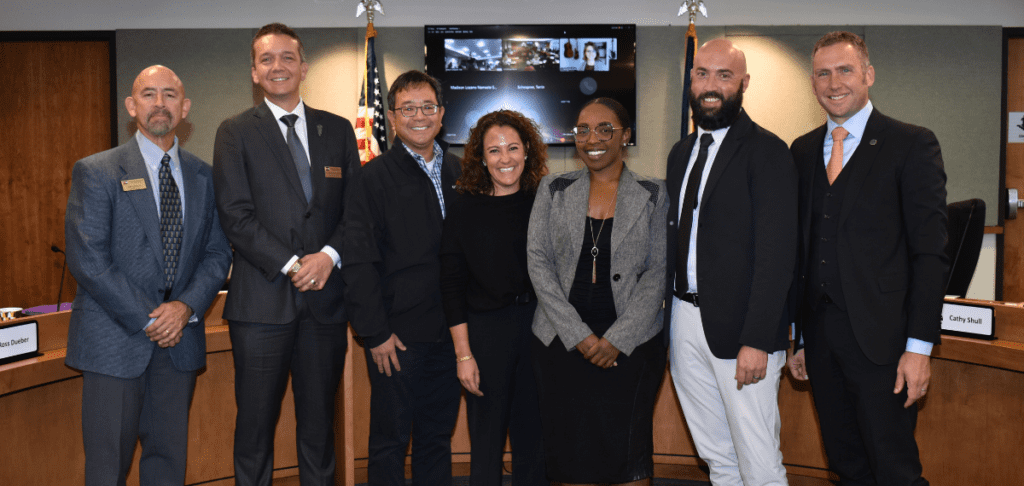
As advances in clean technology accelerate, so does the demand for trained workers.
That was the takeaway from a recent panel hosted by the State Board for Community Colleges and Occupational Education. The board, which oversees the Colorado Community College System (CCCS), invited four industry experts to talk about workforce development needs.
While CCCS colleges currently offer programs in green energy, advanced manufacturing, and other high-tech fields, the sector’s rapid growth will require CCCS colleges to get creative, said Mike Macklin, CCCS vice chancellor for workforce partnerships and development.
“There’s going to be a lot of new and emerging technologies and industries in our state,” he said. “How do we make sure we match the skills needed in those training programs and ensure students have mobility moving forward?”
Building a Clean Energy Workforce
Renise Walker, the assistant director of systems innovation with the Colorado Workforce Development Council, has been working with industry to answer that very question. Her office is part of the state’s “Cleanrange” consortium that brings together government and industry leaders to prepare for the state’s energy transition.
With more than $600 billion in federal investments flowing into the sector, the state stands to gain thousands of jobs, Walker said. Colorado is already home to 33 federal research labs and will soon become the headquarters for leading clean technology firms, positioning the state as a hub for public-private partnership.
“Being able to keep our pulse on how those jobs are changing the landscape in Colorado, and how economic developers are thinking about attracting and retaining businesses in the sector, is part of our goal,” she said.
These trends are already playing out for Terrin Schoepner, the regional wind site manager for NextEra Energy. His company has hired about 400 wind technicians in recent years and plans to dramatically expand operations in Colorado and across the country.
“They’re boots-on-the-ground jobs,” he said. “We really need to get more people into the workforce.”
To meet these needs, Schoepner has turned to Northeastern Junior College (NJC) and Morgan Community College to develop custom curriculum and internship opportunities. NJC has also hired a staff member to promote the wind energy technology program.
“Now we have a recruiter that’s not focused on the high school student at a college fair, but somebody going out to places where we might find the right kind of students—the ones that will consider these mobile jobs,” said NJC president Dr. Mike White. “So as we try to help Terrin solve his problem of building the workforce, it also solves our enrollment problem.”
There’s going to be a lot of new and emerging technologies and industries in our state. How do we make sure we match the skills needed in those training programs and ensure students have mobility moving forward?
‘A Constant Challenge’
Other energy employers are facing similar workforce challenges. Hollie Velasquez-Horvath, a regional vice president with Xcel Energy, said the state’s largest electricity and gas utility has long faced a shortage of lineworkers and pipefitters to safely operate its vast infrastructure network.
“It is a constant challenge, figuring out how to fill that pipeline and ensure that they are qualified,” said Velasquez-Horvath. “It is an amazing job for folks who are willing to make that commitment—it’s just figuring out how we can build that pipeline of education.”
Andrew Huie, vice president of infrastructure at Amprius Technologies, Inc, agrees. His company builds batteries that can store large amounts of energy, requiring specialized training.
“The basic skillsets—whether it’s mechanical, electrical, or chemical engineering concepts—are very important. But when we get into the actual lithium-ion battery manufacturing process, it’s different,” he said. “We’ll need to develop our curriculum working with the high schools and the community colleges specific to those types of machinery.”
In the “solar coaster” industry, keeping up with new technologies can also create workforce gaps, said Madison Lozano, a recruiting coordinator at Namaste Solar. While solar panel installation and servicing remains their core business model, customers are increasingly looking to install electric vehicle chargers and heat pumps.
“In the future, I see that storage and batteries are becoming huge. We’re going to need to have folks that are trained up on that. There are also tech advancements that are happening all the time,” she said. “I would love to hear from some community colleges in terms of how we could partner with you and see what that pipeline could look like. We’re hoping to grow and stay within Colorado.”
No Time to Wait
While companies are facing urgent challenges now, they’re also keeping an eye on innovations coming 10 to 20 years down the road. Colorado’s focus on clean energy has prompted industry leaders to consider advanced nuclear, biomass production, and other out-of-the-box solutions.
“We’re going to have a rapid deployment of resources with the goal that the Polls administration has set of 100% renewable by 2040. That changes the landscape immensely,” said Jessica Blanchard, director of staff development with Photon Brothers. “It’s not just solar, it’s not just wind, it’s not just hydrogen. It’s going to take a lot of resources working together.”
Community colleges must stay ahead of these trends to remain the partners of choice for government and industry, said Dr. Patty Erjavec, president of Pueblo Community College. Colleges must get better at awarding credit for prior work experience and offering more short-term training options.
To that end, PCC recently rolled out a “microcredential” pathway in solar installation that certifies learners within one semester. The college is also partnering with local companies on a solar lab that teaches hands-on skills.
“We really have to be very nimble and responsive,” she said. “Employers are not going to wait two or three years for us to train someone. They want someone in six months, and it needs to be affordable and available now.”
Board member Ross Dueber echoed this sense of urgency. He encouraged college leaders to explore new learning models.
“The industry is very much moving rapidly, and we don’t have time to wait. That’s the shift we have to experience to become more flexible.”


